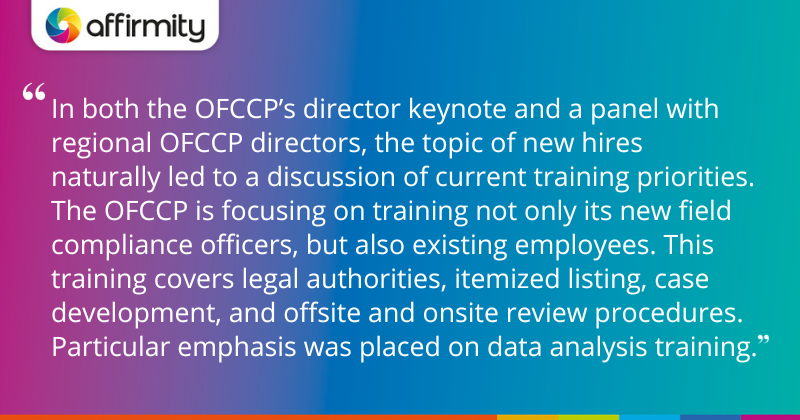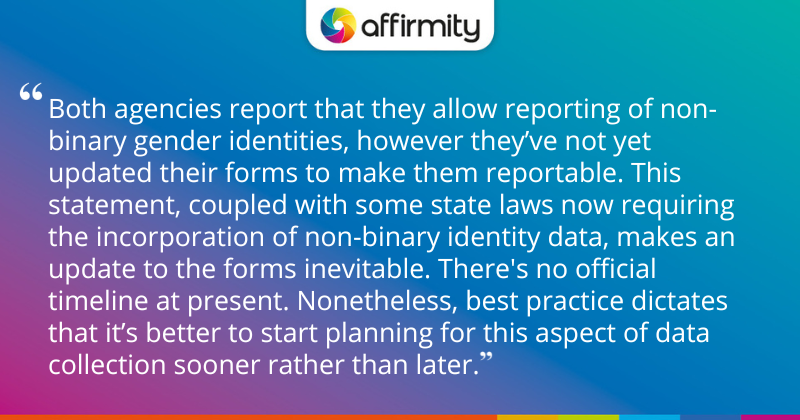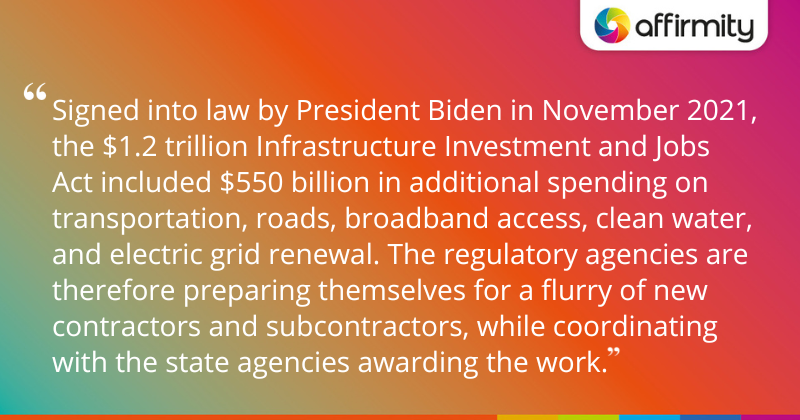The Affirmity team recently attended the 2022 National Industry Liaison Group (NILG) conference in Boston, MA, where the theme was “Be the Beacon of Change”. This annual gathering of federal contractors, subcontractors, and regulators offers an opportunity to gain insight into the current priorities and thought processes at key agencies. In this article, we look at 10 things we learned from this year’s OFCCP and EEOC keynotes, and take a closer look at the implications for everyone working towards affirmative action and equal employment opportunity.
1) The OFCCP Is Hiring (Plus, and Onsite Audits Are Back!)
OFCCP Director Jenny Yang kicked off this year’s conference as the first keynote speaker, providing an overview of the agency’s current priorities. The director opened by stating that the OFCCP is currently in the process of hiring over 100 new employees, of which a high percentage will be field compliance officers.
The OFCCP was also said to have returned to its own offices in May of this year. Alongside confirmation later in the keynote that the OFCCP is resuming onsite audits, all evidence points to the end of the COVID-19 era at the agency.

2) OFCCP Training Is Emphasizing Data Analysis Capabilities
In both the OFCCP’s director keynote and a panel with regional OFCCP directors, the topic of new hires naturally led to a discussion of current training priorities. Through these discussions, we learned that the OFCCP is focusing on training not only its new field compliance officers, but also existing employees.
The OFCCP says that its training is focusing on legal authorities, itemized listing, case development, and offsite and onsite review procedures. Particular emphasis was placed on data analysis training. Earlier this year we saw the OFCCP issue Directive (DIR) 2022-01, providing guidance on compensation analysis obligations. The Affirmity team has since seen the OFCCP requesting more data and generally digging deeper in this area, so this new emphasis on data analysis training makes a lot of sense.
FURTHER READING ON THIS YEAR’S DIRECTIVES | ‘What Do 2022’s New OFCCP Directives Mean for Your Organization?’
3) The OFCCP Is Reevaluating Its Location-Based AAPs Emphasis—And More FAAPs Are Waiting In the Wings
While most employers do location-based AAPs, the OFCCP is aware that many employers do not operate on a location-based basis. In response, the OFCCP plans to update its regulations to work more flexibly and reflect how companies actually operate.
One avenue it’s considering is to utilize Functional Affirmative Action Programs (FAAPs) more widely. It’s actively promoting the FAAP option to organizations that may benefit from using FAAPs, rather than the location-based approach. At the same time, the OFCCP director did acknowledge feedback about the length of time it takes to review and approve FAAP requests from contractors, and said that it’s looking at incentivizing their use.
4) Both OFCCP and EEOC Will Soon Require Data Collection of Non-Binary Identities
Both agencies report that they allow reporting of non-binary gender identities, however they’ve not yet updated their forms to make them reportable. This statement, coupled with some state laws now requiring the incorporation of non-binary identity data, makes an update to the forms inevitable. While we could speculate that the requirement could come in before next year’s EEO-1 cycle, there is no official timeline at present. Nonetheless, best practice dictates that it’s better to start planning for this aspect of data collection sooner rather than later.

5) Multiple Panels Mentioned the HIRE Initiative
The Hiring Initiative to Reimagine Equity (HIRE) is a joint initiative by the EEOC and OFCCP that launched earlier this year. It’s described as a “multi-year collaborative effort” to “expand access to good jobs for workers from underrepresented communities and address key hiring and recruiting challenges.”
The HIRE initiative was mentioned in multiple panels, and discussion focused on a wide range of groups, including individuals with disabilities, people who had formerly been incarcerated, and job seekers who have gaps in their employment.
MORE AFFIRMATIVE ACTION CONTENT FROM THE BLOG | ‘4 Important Actions That Will Strengthen Your Affirmative Action Plan Narratives’
6) Retaliation Is a Key Concern for the Agencies
Another topic that emerged in multiple discussions in various forms was retaliation. The OFCCP discussed wanting to empower employees to participate in the audit process without fear of retaliation—emphasizing that employee stories added important context to the data they collect. Meanwhile, EEOC Vice Chair Jocelyn Samuels highlighted the agency’s anti-retaliation efforts in its keynote, noting that retaliation against employees who come forward is its most cited charge.
Speakers made reference to a joint anti-retaliation initiative announced last November between the EEOC, Department of Labor, and National Labor Relations Board as a major counter-measure. This initiative included a memorandum of understanding between the agencies and signaled their intention to more actively cooperate on the issue.
7) The Infrastructure Investment and Jobs Act Is Keeping the Regulatory Agencies Busy
Signed into law by President Biden in November 2021, the $1.2 trillion Infrastructure Investment and Jobs Act included $550 billion in additional spending on transportation, roads, broadband access, clean water, and electric grid renewal. The regulatory agencies are therefore preparing themselves for a flurry of new contractors and subcontractors, while coordinating with the state agencies awarding the work. Large federal construction contractors will be required to participate in the OFCCP’s Mega Construction Program.

8) The Agencies Remain Alert for Harassment, and Expressed Concern About Caregivers
During a plenary session on “Moving Towards a Culture of Equity” featuring Director of the Women’s Bureau Wendy Chun-Hoon, OFCCP Director Jenny Yang, and EEOC Chair Charlotte Burrows, harassment was highlighted as a persistent issue. Construction, trucking, and agriculture were specifically mentioned as problem sectors/industries.
Another topic discussed by the panel was caregiving, specifically with regards to women and especially women of color. It was observed that during the pandemic, these groups were disproportionately compelled to leave the workforce in order to facilitate caregiving. This is now considered a bipartisan issue at the EEOC, with measures designed to address it forthcoming.
INSIGHTS FROM OUR OFCCP COMPLIANCE VIDEO SERIES | ‘OFCCP Compliance Series: How to Review Compensation to Identify Pay Disparities’
9) The EEOC Is Seeking Input On Revisions to Its Strategic Enforcement Plan
The EEOC’s current Strategic Enforcement Plan has been in place since 2017, establishing the agency’s priorities and methodology across its private, public, and federal sector enforcement responsibilities. This plan is now up for renewal and the agency is working on modernizing it for the next five years. During her keynote, EEOC Vice Chair Jocelyn Samuels appealed for employer input, questions, and suggestions to help shape the plan.
10) Uptake of the OFCCP Contractor Portal Has Been Slow
Though the deadline for self-certification through the OFCCP’s new portal has now passed, the portal is still open. Approximately 44% of contractors certified by 30 June, with at least some of those who didn’t subject to technical issues. Contractors who submitted a ticket for technical assistance on or before the deadline will be considered to have met the deadline.
Contractors who haven’t certified by 1 September 2022 will be included on a list sent to federal contracting officers, and contractors who don’t self-certify are more likely to appear on the OFCCP’s scheduling list.
Discover how Affirmity can help you prepare for affirmative action planning and audit activity: check out our Affirmative Action Plan services or contact us for more information.
 About the Author
About the Author
Christine Avila, Manager, Consulting Services, has been with Affirmity since 2010. She manages a team of consultants and advises clients in a variety of industries on affirmative action, equal employment opportunity, and diversity issues.
Prior to joining Affirmity, Ms. Avila had seven years of compliance experience as well as four years of recruiting experience for companies in the media and finance industries. Ms. Avila has served on the North Texas Industry Liaison Group (NTILG) Board since 2011.
